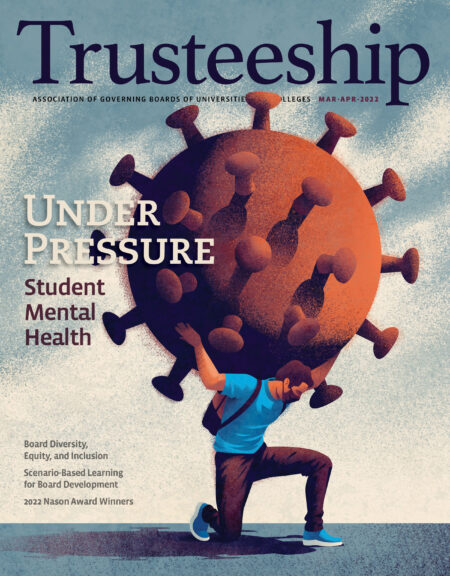
Two years ago, college and university trustees, administrators, faculty, staff, and students were forced to respond to the rise of COVID-19. Most institutions quickly pivoted to remote instruction. Since then, higher education leaders have grappled with challenges to the health and well-being of all campus constituencies as well as day-to-day operations. In these unprecedented circumstances, many boards became more involved in making decisions with academic implications that normally would have been in the purview of the chief executive with robust input from the faculty.
Even as we all continue to grapple with the pandemic and the strategic challenges facing higher education, AGB encourages all institutions to regularly assess the performance of their boards and chief executives. These assessments should be designed to create an action plan based on their findings with measurable goals and outcomes, to ensure boards are fulfilling their fiduciary responsibilities, and that campus leaders are effectively operating the institution. Indeed, assessments are a fundamental component of exemplary board governance and are required by major accreditors.
President/CEO Assessments
Institution, system, and foundation boards all have a core responsibility to evaluate the chief executive’s performance and to support their growth and leadership. As noted in AGB’s book Assessing and Developing College and University Presidents (AGB.org/AssessingandDevelopingPresidents), “Assessment and development go hand in hand as underpinnings of high-functioning leadership.”
In addition to using the traditional categories of assessment, boards today should also take into account the challenges that COVID-19 has presented and the new pressures it has brought to bear on colleges and university leaders. For example, as institutions have struggled with an array of tactical matters including whether classes should be in-person, remote, or hybrid and what testing and vaccination protocols should be required for students, faculty, and staff, they have in the last two years either shifted or put on hold many institutional strategic priorities. As a result, presidents need to ensure that there are clear and persistent communications with both the board and with campus constituencies and beyond.
In these stressful times in which many institutions for the first time relied on or expanded remote education, it is critical that they make student success—for all students—a priority and a key component of all presidential assessments.
Finally, as boards assess their institution’s chief executive, they need to take into account and help strengthen their emotional and mental well-being. It is no surprise that since many senior leaders have run at a dead sprint for the last two years, burnout has cut short the tenure of many good college leaders. At the same time, chief executives need to address the fact that members of their administration, faculty, and staff are equally exhausted.
Board Assessments
Just as boards routinely evaluate their chief executives, AGB strongly recommends that boards evaluate themselves regularly and meaningfully. For example, some institutions retain an outside expert to conduct simultaneously a 360-degree review of the president and a review of the board. Others do these separately. Whatever their approach, by establishing a thorough assessment process and a clear plan to address the findings, boards hold themselves accountable, demonstrate their commitment to serve and safeguard the institution’s mission and long-term vitality, and promote exemplary board leadership.
A thorough board assessment is designed to uncover strengths, identify areas of opportunity, bolster relationships, build trust, and improve individual and board effectiveness. They provide an opportunity for boards to determine whether they include important areas of experience and board members with diverse backgrounds and perspectives. Assessments also enable boards to step back from the preoccupations of regular board business, candidly review board performance, and develop action steps to strengthen board operations, strategic focus, communication, and dynamics.
For assistance to conduct a thorough and meaningful assessment for your chief executive and board, or to develop a succession plan to enable smooth leadership transitions for your institution or foundation, please contact consulting@AGB.org.
This is an exciting although frenetic time for higher education, requiring strategic, thoughtful board leadership. AGB is here to support you in your efforts to govern with knowledge and confidence by making available to you our vast knowledge center, our customized consulting and executive search services, and our unparalleled educational events that offer both expert and peer perspectives. We wish you all success in these efforts.
Henry Stoever, AGB President and Chief Executive Officer



